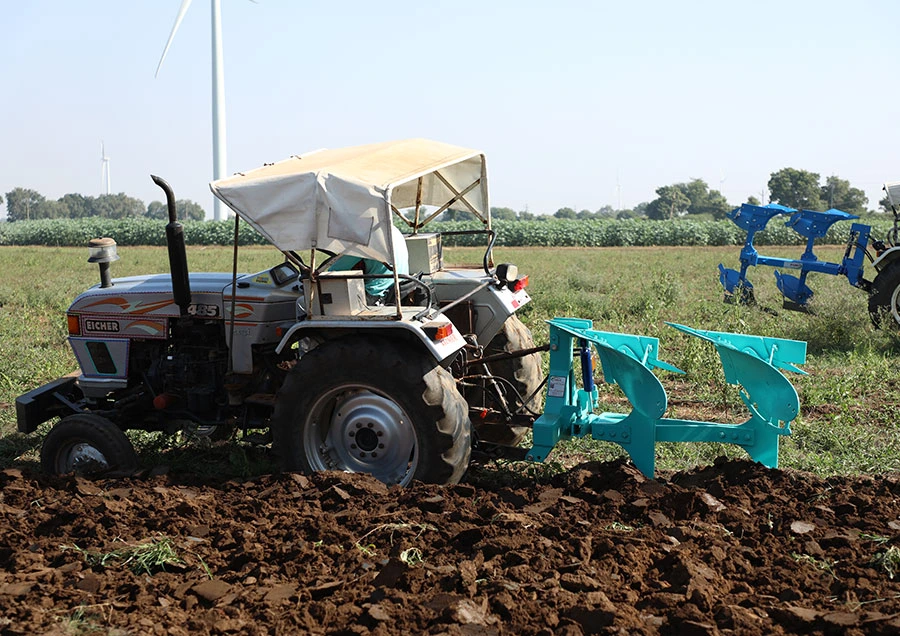Chat With Us
+91 99253 37969Pros and Cons of Rotavators: Understanding Their Role in Farming

If you've ever looked at a large field and wondered how it transforms from rough soil to a neat, plant-ready farm, a rotavator might be the answer. But what is a Rotavator? It’s a powerful farm machine that makes ploughing and preparing the land easy, saving farmers both time and energy.
Like any agricultural tool, it has its pros and cons. In this blog, we’ll explore what a Rotavator is in simple terms, along with its advantages and disadvantages.
What is a Rotavator?
A rotavator, also known as a rotary tiller, is a machine used for tilling the soil. It has sharp blades that cut into the earth and break it up into small pieces. This makes the soil ready for planting, as it becomes easier for water and nutrients to reach plant roots. Think of it as a big blender for the ground that mixes everything up for a perfect planting bed.
Rotavators come in various sizes, from small ones for home gardens to massive ones used on farms. They are usually attached to tractors, though smaller versions can be pushed by hand. Farmers often ask what a Rotavator is because it plays such an important role in soil preparation, helping both small gardeners and large-scale farmers.
Advantages Of Rotavator
1. Time-Saving Land Preparation:
Manual ploughing or digging takes hours, if not days. With a rotary tiller, you can prepare large areas of land in much less time. The machine does the heavy lifting, so you don’t have to break a sweat.
2. Even Soil Mixing for Better Growth:
Rotavators mix the soil evenly, ensuring that nutrients are spread throughout. They also help break up clumps, creating a fine texture that is ideal for planting. Plants grow better when their roots can easily spread through the soil.
3. Weed Control Through Uprooting:
As the rotavator churns the soil, it uproots weeds. This means fewer weeds to pull by hand. It gives your crops more room to grow.
4. Easy-to-Use for All Skill Levels:
You don’t need to be an expert to use a rotary tiller. Most machines come with simple controls, making them user-friendly for farmers and gardeners alike. Whether you’re tilling a small patch or an entire field, it’s as simple as guiding the machine.
5. Versatile Uses:
Rotavators aren’t just for preparing soil. They can also be used for mixing in compost or fertilizer. It improves soil health. You can even use them for breaking up old turf or preparing the land for laying sod.
Disadvantages Of Rotavator
1. Soil Structure Damage from Overuse:
While a rotary tiller mixes the soil well, overuse can harm the natural structure of the soil. Too much tilling can lead to compacted layers beneath the surface, which can prevent water from draining properly and roots from growing freely.
2. Fuel and Maintenance Costs:
If you’re using a tractor-mounted rotavator, it will run on fuel. This means additional costs for fuel, not to mention the regular maintenance the machine will need. It’s not just a one-time investment.
3. Not Suitable For All Soil:
Rotavators work best on medium-textured soils. If the soil is too hard, the machine might struggle, and if it’s too soft, it might sink or not till properly. You’ll need to assess your soil before using one.
4. Risk of Spreading Weeds and Pests:
While rotary tillers help control weeds, they can also spread weed seeds or pests throughout the field if not used carefully. This can lead to unwanted growth and infestations, which could harm your crops.
Also read: Cultivator vs Rotavator: Understanding the Differences
Application Of Rotavator
Rotavators are multitaskers. There is a wide range of applications that can help you in maximizing productivity and reducing labor. Here are some of the most common applications of a rotary tiller:
- This is the most common use. Before sowing seeds, the land needs to be tilled. The rotavator prepares the soil by breaking it up and making it soft and workable.
- As mentioned earlier, rotary tillers can be used to uproot weeds, especially if used before planting season. It helps clear the field of unwanted plants.
- If you’re looking to enrich your soil with nutrients, a rotavator can mix compost or fertilizer evenly into the ground, ensuring that every part of the land is nourished.
To know more about its applications, check our Uses of Rotavator blog.
Wrap Up
Rotavators are a great tool for anyone looking to prepare their land for planting. They save time, improve soil quality, and help control weeds, making them a favorite among farmers and gardeners alike. However, it’s important to use them wisely to avoid damaging the soil structure or spreading pests.
By choosing the right rotary tiller for your needs and using it properly, you’ll have a valuable helper in your gardening or farming efforts. Whether you're tending a small garden or a large farm, a rotavator can make your work easier and more efficient.
FAQs
What is a Rotavator used for?
A Rotavator is used to break soil, mix nutrients, and prepare farmland for sowing seeds.
What are the main uses of a Rotavator?
It is used for soil preparation, mixing compost or fertilizer, and uprooting weeds.
Can a Rotavator be used in all types of soil?
No, it works best on medium-textured soils and may not perform well on very hard or very soft soils.
What are the advantages of using a Rotavator?
It saves time, mixes soil evenly, helps control weeds, and is easy to use.
What are the disadvantages of using a Rotavator?
Overuse can damage soil structure, it requires fuel and maintenance, and it can sometimes spread weeds or pests.





